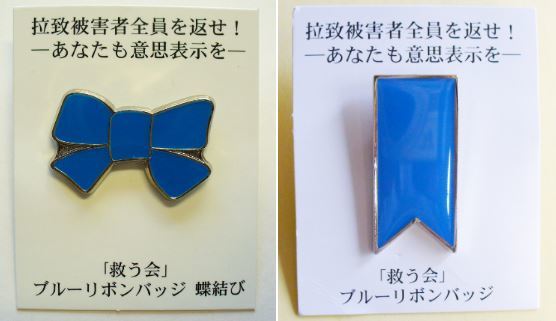While Japanese Prime Minister Fumio Kishida visited Korea, the blue badge on Prime Minister Kishida’s collar is attracting attention. The badge is a ‘blue ribbon’, a symbol of the will to solve the problem of Japanese abductees.
Prime Minister Kishida, who visited Korea for one night and two days, visited the National Cemetery in Dongjak-gu, Seoul on the 7th and visited the Yongsan Presidential Office to hold a joint press conference following the Korea-Japan summit. He wore a blue ribbon on the right collar of his jacket throughout the schedule.
This blue ribbon is the symbol of the civic group ‘Sukuukai’ (Rescue Society), which raised the possibility that as many as 100 Japanese abductees may reach 17, not the official announcement of the Japanese government, ‘Blue Ribbon’. The Japanese prime minister and other key cabinet members wear blue ribbons symbolizing the release and rescue of all Japanese abductees to North Korea whenever they appear at public events.
The issue of Japanese abductions by North Korea became public after it was confirmed that some Japanese who went missing in the 1970s and 1980s were abducted by North Korea. At the time, North Korea was known to have kidnapped a total of 17 Japanese on 12 occasions to train agents.
 A blue ribbon promoted by the civic group “Sukukai” (Rescue Society). Courtesy of Sukuukai
A blue ribbon promoted by the civic group “Sukukai” (Rescue Society). Courtesy of SukuukaiIn order to resolve this issue, the Japanese government discussed preventing a recurrence with then-Japanese Prime Minister Junichiro Koizumi during a visit to North Korea in September 2002 with North Korean leader Kim Jong-il. At the time, Chairman Kim admitted to abducting Japanese and returned five of the 17 to Japan.
Since then, North Korea has acknowledged the fact that only 13 out of 17 abductees claimed by Japan have entered North Korea. Eight people, including Megumi Yokota (13 years old at the time of her disappearance in 1977), a symbol of abduction victims, died in North Korea, and the other four claimed that they never entered North Korea.
In response, the civic group ‘Sukukai’ is demanding that the North Korean authorities return the abductees, raising the possibility that not only the 17 abductees the Japanese government is claiming, but also about 100 Japanese citizens have been abducted by North Korea.
In a joint statement last month regarding the abduction issue by North Korea, “We are committed to the We express serious concern over the issue of forced disappearances, including the abductions of nationals of the Republic of Korea and Japan, and unrepatriated prisoners of war.”
Source: Donga
Mark Jones is a world traveler and journalist for News Rebeat. With a curious mind and a love of adventure, Mark brings a unique perspective to the latest global events and provides in-depth and thought-provoking coverage of the world at large.